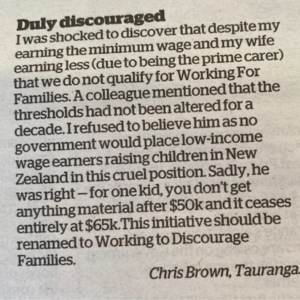Prime Minster Chris Hipkins has acknowledged that working families are really struggling. Cost of living issues are out of hand. Minister of Finance Grant Robertson has signalled a recession is on the way. Worse still it is in a time of high inflation.
Working for Families (WFF) is the major way NZ children are supported to ensure there is sufficient income for children in low and middle income families to live free of poverty.
But as a recent letter to the Herald suggested, it is time to name it more honestly.

Lets just call it NOT Working for Families (NWFF). The govt had nearly 6 years in which to reform NWFF. All we have seen are some over-due and inadequate inflation adjustments and an unconscionable rise in the abatement rate to 27% from a fixed household income of $42,700.
These tax credits need to be a secure cushion of income for families when hard times strike. Instead, in this recession, after just a two week grace period, when a family loses paid work, the NWFF cushion will become a hard landing and will be cut by at least $72.50 a week—with an extra $15 cut for each child in larger families. This cut will occur even if no welfare benefit is accessed.
Since 1 April 2021, you can keep receiving the in-work tax credit for up to 2 weeks when taking an unpaid break from work. This could be either as you transition between jobs, are unpaid for a period, or leave employment. If you’re taking an unpaid break from work, you’ll need to notify IR to ensure your IWTC payments continue. The best way to do this is through myIR.(IRD website)
And woe and betide the family that doesn’t realise they no longer qualify. They will have to repay any over-paid payments. NWFF debt to IRD continues to rise.
The payment of at least $72.50 is grossly misnamed the In Work Tax Credit. It should be called the Child Penalty for Poverty (CPP). It has nothing to do with being a work incentive. When low-income families in this recession find they need the support of a welfare benefit, it doesn’t matter if they obtain some part-time work and get only a part of a benefit, they still are denied this payment for their children.
How insulting to imply that families in this coming recession who lose work need a work incentive.
In this recession, if families, already overwhelmed in the aftermath of Covid and the cost of living crisis, have one parent lose their job, that parent may have no recourse to any welfare benefit. The crazy couples-based welfare system has also not been fixed in five and half years as the government toyed with an unworkable social insurance scheme.
Increasingly it is not just those on benefits who cram into social agencies seeking help. Too many families in paid work face impossible clawbacks from low income levels. How ironic is this for a scheme that purports to be about helping working families with work incentives? As Chris Brown says in his letter, they lose a very high percentage of income they earn over the low fixed household income level at which their family assistance reduces. This is doubly cruel as any increases in income to compensate for inflation is simply taken back or creates debts that must be repaid.
Urgent actions to prepare for the coming recession MUST include at bare minimum
- Renaming NWFF to reflect the needs of children, not paid work.
- Until the needs of children are put at the centre the poorest children will continue to miss out
- Add the offensive CPP to the first child entitlement so there is just one WFF payment. This would mean at least $72.50 weekly more for one to three children, and more for extra children in the worst-off families in the benefit system. The cost is around $500m pa, but would be highly cost effective in reducing poverty and remove discrimination on benefit/work status.
- Index all aspects to wages annually (and to inflation where it exceeds wage growth) as is the case for NZ Super.
- Also increase the threshold at which WFF starts to reduce to restore the real value last set in 2018. In 2022/23 it should be at least $50,000.
- Reduce the abatement rate from 27% to 20% as it used to be until it was ratcheted up by National.
- Make welfare benefits accessible on an individual not a couple basis
Lets not hear that ‘we cant afford it’ or that it will add to inflationary pressures. New Zealand has a very low level of government debt. If we can siphon of $2 billion a year for the New Zealand Super Fund, we can support our low-income families in the recession. Please don’t fudge this issue by saying there is a review going on- after over five years it is wearing thin.





